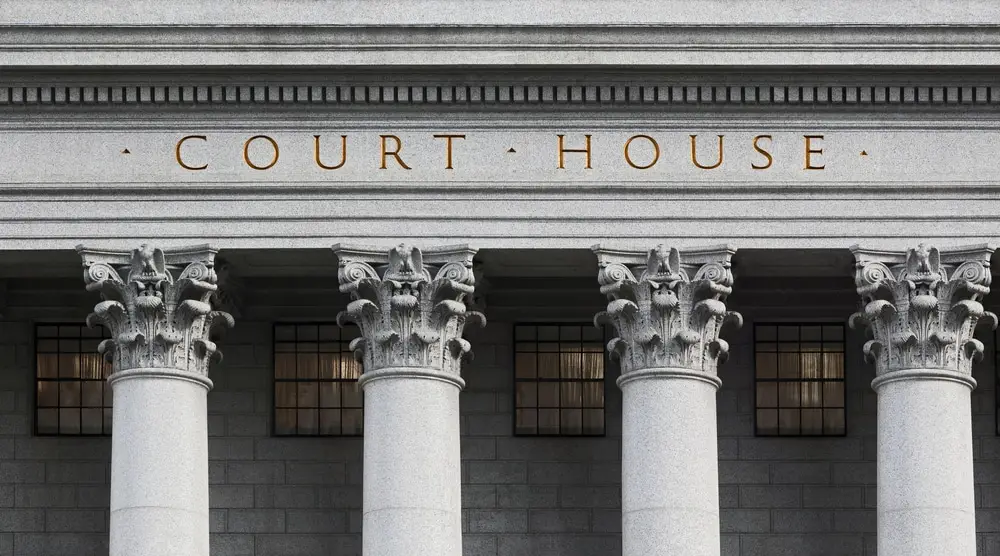Are you curious about the different types of court bonds that are involved in legal proceedings and guarantee a successful outcome in court case? Then this guide to attachment bonds is perfect for you! Here, we’ll discuss the types of court bonds—essential elements in any lawsuit dispute—what their purpose is, as well as how much they cost. Now let’s dive deep into becoming a pro when it comes to all things related to court bonds!
Short Summary
- Court bonds provide protection and guarantee financial compensation in court proceedings.
- Different types of court bonds include judicial, fiduciary, plaintiff and defendant bonds.
- Obtaining a court bond requires consultation with a surety provider or legal expert to ensure compliance with relevant laws and regulations.
Understanding Court Bonds

A court bond is a type of surety bond that serves many different functions in the legal system. It ensures justice and protects the court dismiss those involved from any fraud or misuse of funds, while also reducing potential financial losses caused by rulings made in the courtroom.
Court bonds are commonly classified into two groups: judicial bonds and fiduciary bonds, both providing assurances over economic liabilities within this realm. Speaking, plaintiffs will be required to have such a fiduciary bond.
On occasion, it can fall on defendants too (e.g., cases involving a guardianship bond). There are an array of types available which would include appeal bonds, administrator bonds & executor bonds, lien & injunction ones as well as plaintiff-related obligations…all subject to various state laws concerning their necessity for any given situation/court rule etc.
Thus understanding how each part of specific court bond works together becomes key in guaranteeing adherence to all court rules and decisions while protecting parties through sound fiscal security measures put forward via these so called ‘Court Bonds’.
Judicial Court Bonds

Court bonds, also referred to as judicial bonds, are a type of surety that helps restrict possible losses due to an unfavorable court decision. These security measures protect those taking part in legal proceedings from any risks posed by the judgement made by the court and consequently limit them from facing financial losses.
Common types of these court bond types of guarantees include appeal bonds (commonly known as supersedes bonds) which allow parties involved in litigation suits to contest their judgment or injunction bond guarantees meant for protecting defendants against any damages caused through injunctions initiated by plaintiffs.
In cases where one party contests another’s possession of property legally owned by themselves – replevin and counter-replevin claims require posting collateral like ordinary judiciaries do, thus playing important roles in formulating protective mechanisms for debtors against potentially expensive damages arising out of disputes handled under law judiciary systems.
Fiduciary Bonds
Fiduciary bonds are an assurance that those given the authority by a court will meet their legal requirements. These types of custodian bonds can consist of conservator bonds, executor bonds, administrator bonds, guardian bonds, custodian bond, and probate bond, VA fiduciary Bonds.
A lien bond is necessary for the removal of any encumbrances on property enabling owners to regain control over assets they own. The intention behind each type of fiduciary bond is connection guarantees faithful service to obligations set forth within a particular instance, such as following with accuracy instructions from wills or mandates stated under law when designated administrators are involved.
The Role of Surety Bonds in Court Proceedings

Surety bonds are an important part of court proceedings, providing assurance and security for all parties involved various court proceedings. A court surety bond serves as a safeguard against potential losses or other problems that may result from the legal process by guaranteeing financial reimbursement or compliance with rulings set forth in the courts. To properly understand these roles, it is crucial to have familiarity with basic principles concerning such court surety bonds, including who they apply to and their purpose.
To understand surety bonds themselves, being knowledgeable about how exactly these bonds ensure and guarantee protection during court procedures is equally essential – since this particular type of bond provides recompense if the court decides that any court ruling isn’t followed or when financial loss or damage occurs due to decisions made in litigation situations – giving everyone peace of mind through insurance coverage.
Surety Bond Basics
A surety bond is a three-way agreement that consists of the principal, who must fulfill their contractual obligation’s faithful performance. An administrator bonds the obligee – the plaintiff bond being the person receiving said obligation. And finally a third party (the surety) guarantees this performance.
Companies like The Palmetto Surety Corporation that has over 20 years of collective experience providing court surety bonds as well as contract ones – forming strong relationships with customers that enable them to successfully respond quickly when necessary to court expectations. This understanding shows us how essential these types of bonds are when it comes to protection during court proceedings.
Pricing Costs and Factors Affecting Court Bonds

A court guardianship bond is a process that requires the help of either a surety provider or an expert. They are essential guardianship bond in providing insight into the costs and factors of plaintiff bond which determine its pricing, such as credit score, required amount of bonds (as well as their duration), and type distribute assets. These premiums typically range between 0.5% to 3%.
In order for one to be able to obtain this kind of bond, it is necessary for them to acquire assistance from somebody experienced with these kinds of transactions in order ensure they understand all expenses involved before proceeding with obtaining any contract-binding documents like these specific types of security measures called sureties/bonds.
How to Obtain Court Bonds
To get a court bond, start with a Surety Bond Search, click get quote once you find the court bond you need, then fill out the application form for your specific court bond required. Pay the Premium online, Docusign the agreement and then simply download and Print your new Court Surety Bond. By following each step outlined above, someone seeking a court surety bond ensures obtaining their court bond both promptly and successfully.
Differentiating Plaintiff Bonds and Defendant Bonds
Bonds used by both plaintiffs and defendants differ in terms of their purpose for court proceedings. Plaintiff bonds, like counter, a replevin bond, bonds, bond, bonds or injunction bonds, serve as security to the defendant should the plaintiff be unsuccessful in a trial. These bonds guarantee that any losses suffered will be covered by the party who initiated legal action through these kinds of securities, such as a replevin bond which ensures seized property remains untouched, or an injunction bond which shields them from damages acquired due to an order made by those claiming relief.
On the other hand, with appeal bounds amongst others, also referred to as defendant’s bound, they ensure that possible claims are unable to provide satisfaction. Mainly safeguarding family members and potential victims from being wrongly targeted through litigation matters – allowing this particular type of jurisdiction protection despite deceased person standing imposingly against another deceased person filing suit.
Terms and Qualifications for Court Bonds
When thinking about court bond terms and qualifications, the length of legal proceedings along with any surety-specific agreements play an essential role. It is important to take into account different types of bonds like an appeal bond, surety bonds, custodial bond guarantees, and probate bond bonds, sureties or injunction related protections, which all have distinct prerequisites for approval.
To understand these needs it’s crucial to check in with a reliable surety provider or seek advice from a professional lawyer as failing so can lead to noncompliance issues among involved parties within such courtroom processes. Thus, making sure that everyone has agreed on their respective liabilities is vital for satisfactory completion when looking at matters involving court loans and other similar securities such as those found under the umbrella term ‘bond’.
Ensuring Compliance with Court Bonds Requirements
Adhering to court rules and bond demands is essential in order to safeguard all participants of the legal process. These requirements may include how many sureties are required, what amount must be set as a minimum bond and which type of bond would fulfill these prerequisites.
For instance, the bond required when two people act as security deposits for the agreement’s profits or compliance with stipulated regulations – unless it is determined that one individual suffices, they have to be stated on the corresponding documentation accordingly. The bond amount written down needs also comply with law – usually not below $100 at any cost!
It’s key that before executing anything related to this matter you look into relevant laws, court rules, & procedures connected directly or her finances with fulfilling such, bonds ensure all provisions in order for everyone involved during proceedings remains secure, thus contributing towards a seamless & just resolution overall.
Summary
Being familiar with the types of court bonds, their applications and how costs can be influenced by attachment bond is important for an efficient legal experience. To guarantee smooth proceedings in an appeal bond the court appoints it’s advisable to work alongside a surety bond provider or solicitor while making sure all court bond requirements are adhered too. Being knowledgeable on this matter has its advantages, as having awareness about what goes into these kinds of judicial bonds, will go a long way in your journey through the judicial system.
Frequently Asked Questions
What type of bonds are there in court?
Court bonds can come in a variety of forms, such as probate bonds, lis pendens bonds, administrator bonds, guardianship bond, probate bond, probate bonds, lost note bonds and release of lien.
Bonds among others. These types of securities are Separated into two categories: Plaintiff Bonds and Defendant Bonds, which serve the purpose to protect financially against a court ruling.
Appeal bond or an injunction bond may also be issued by federal courts for specific cases that require specific court bond for them.
What are court bonds within the legal system?
A bond, often provided by a bail bond company, is sometimes set up through what’s known as a Personal Recognizance or PR Bond.
This monetary sum assures someone’s release from detention pending claim, and certain court-ordered legal duties are met. By this, attachment bond means the defendant may be freed until their trial date while still being held accountable to fulfill these requirements, all without having to pay any additional funds upfront beyond the initial amount posted in good faith for them as part of securing such bonds.
What is the purpose of a performance bond?
A performance bond is a form of contract construction guarantee offered by Surety companies wherein they accept responsibility for ensuring the contractor honors all terms laid out in the agreement.
Should anything go wrong and fail to be completed, it will then fall upon them either to find another entity willing to finish or provide bail amount of monetary recompense as suitable compensation for financial loss.
What are the two primary categories of court bonds?
Two types of bonds which are often used in court proceedings include a bail bond, a judicial bond and fiduciary bonds. These bonds serve to guarantee the defendant’s property that certain legal obligations will be upheld.
What factors influence the pricing of court bonds?
When deciding on court bonds, it is important to understand the amount, type and duration of bonds required as these factors can significantly affect pricing. The magnitude of the bond necessary must be determined based on a number of criteria such as risk assessment or other stipulations in an agreement between parties.
It is advisable to have all relevant information prior to making any commitment regarding securing bonds for legal procedures. Bonds provide financial security and should not be taken lightly. Research into their prices needs to take place beforehand in order to ensure you are getting great value for your money when procuring them.
Is a Bail Bond a Fiduciary Court Bond?
No, a bail bond is not a fiduciary court bond. A bail bond is a type of surety bond that is posted to secure the release of a defendant from jail. The bond guarantees that the defendant will appear for all of their court hearings.
A fiduciary court bond, on the other hand, is a type of surety bond that is posted to guarantee the faithful performance of a fiduciary duty. Fiduciary duties are duties of trust and confidence, such as those owed by an executor, administrator, or trustee.
Here are some of the key differences between bail bonds and fiduciary court bonds:
- Purpose: A bail bond is posted to secure the release of a criminal defendant from jail, while a fiduciary court bond is posted to guarantee the faithful performance of a fiduciary duty.
- Who posts the bond: A bail bond is typically posted by a bail bondsman, while a fiduciary court bond is typically posted by the fiduciary himself or herself.
- Amount of the bond: The amount of a bail bond is set by the court, while the amount of a fiduciary court bond is typically set by the court or by the fiduciary’s surety company.
- Requirement to forfeit the bond: If a criminal defendant fails to appear for their court hearing, the bail bond is forfeited. If a fiduciary fails to fulfill their fiduciary duties, the fiduciary court bond may be forfeited.


